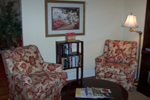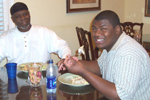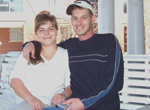ACS offers home away from home
by Michael BakerPublic Relations
When receiving treatment, cancer patients sometimes find themselves far from home and stretching their finances. Hospital costs, transportation fees, and hotel charges sap financial resources with remarkable speed.
There exists a place, however, where these temporary Charleston residents can find respite from their treatments.
For nearly 24 years, the American Cancer Society’s (ACS) Hope Lodge has provided a home-style setting for adult cancer patients receiving treatment in Charleston. Located on the corner of Ashley Avenue and Calhoun Street, the two-story house serves many patients at MUSC and in hospitals around the area.
According to Elaine Caraviello, general manager of the Hope Lodge, the house provides desperately needed relief to many of its residents, for whom cancer therapy is an arduous process.
“The average patient stays here for two months,” she said. “When you include the nightly price of a hotel and the cost of parking downtown, treating their cancer becomes incredibly expensive. Some people have told me that if it weren’t for the Hope Lodge, they couldn’t afford to receive treatment.”
 A
library offers quiet reprieve from cancer treatments.
A
library offers quiet reprieve from cancer treatments.
The historic house, built in 1910, has served the community for almost a quarter of a century. In 1970, Margot Freudenberg, the American Cancer Society’s longest-serving volunteer, organized the merger of two small houses on Calhoun Street. Construction merged the structures into one larger building, creating the first Hope Lodge in the United States. Since then, the American Cancer Society has developed 19 others.
Charleston’s Hope Lodge accommodates eight guests at a time. Guests must be cancer patients, aged 18 years or older, receiving active outpatient therapy (chemotherapy, radiation therapy, etc.) at a Charleston-area medical center. They also must live more than 40 miles from the Hope Lodge and bring a caregiver for the duration of their stay.
To function, the house depends on the assistance of volunteers. Assistant/evening manager Sundi Herring explained the various ways in which the community can donate its services.
 In
the dining room, Dajuan Mack, right, and Moses Jenkins enjoy a dinner provided
by The Crab House.
In
the dining room, Dajuan Mack, right, and Moses Jenkins enjoy a dinner provided
by The Crab House.
“Some groups donate meals. Other people volunteer to answer phones and help us with check-ins,” she said. “Elena Bell (MUSC social worker) holds cancer support and education groups here, and we’ve had gardeners volunteer their services as well.”
“There really are no limitations as to what people can donate,” Caraviello added.
Less typical donations have included passes to the South Carolina Aquarium and the local IMAX theater and tickets to Charleston Battery soccer games. One local group even decorated the house for Christmas.
Similar donations, big and small, have kept the house running for almost a quarter of a century.
“There are so many ways to support our guests. It just shows how a little bit of energy goes so far,” Herring said. “Charleston is such a hospitable city; having a Hope Lodge here makes so much sense.”
Guests have noticed the hospitality and generosity, returning to the house not just during ongoing treatment sessions. Many former guests even drop by just to say hello.
“A lot of friendships start here,” Caraviello said. “No one wants to go through cancer, but many people said this was the bright spot in their treatment.”
Herring said guests often go to the grocery store together, make breakfast for each other, help with each other’s laundry, and play board games together. Frequent visitors often show newer guests around the city.
“In a hotel, no one knows what you’re going through, but everyone at the Hope Lodge shares similar experiences,” she said. “I know it sounds cheesy, but it’s like a family here.”
 Lee
and April Smith share a peaceful moment on the Hope Lodge’s porch swing.
Lee
and April Smith share a peaceful moment on the Hope Lodge’s porch swing.
A porch swing, a cozy library, a dining room looking out onto Calhoun Street, and walls lined with paintings of local color provide further homey touches. Although the house offers no medical services, bookshelves full of educational materials provided by the American Cancer Society give guests the opportunity to learn more about their illnesses.
When guests retire to the privacy of their rooms, each space contains two twin beds, a private bathroom, an armoire, a television, and a ceiling fan. The house also offers access to an Internet-ready computer.
The welcoming aura struck a chord with Herring, a South Carolina native who worked in a Ronald McDonald House in Virginia and traveled to South America with the Peace Corps before returning to her home state.
“Going away helped me realize that home was where I wanted to be,” she said.
Her sentiment holds true for patients who journey to Charleston to battle
their cancer. Tackling an illness in a strange, new city may not be easy,
but the Hope Lodge tries to provide as much comfort as possible until its
guests can return home again.
Friday, July 23, 2004
Catalyst Online is published weekly, updated
as needed and improved from time to time by the MUSC Office of Public Relations
for the faculty, employees and students of the Medical University of South
Carolina. Catalyst Online editor, Kim Draughn, can be reached at 792-4107
or by email, catalyst@musc.edu. Editorial copy can be submitted to Catalyst
Online and to The Catalyst in print by fax, 792-6723, or by email to petersnd@musc.edu
or catalyst@musc.edu. To place an ad in The Catalyst hardcopy, call Community
Press at 849-1778.